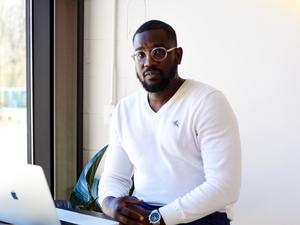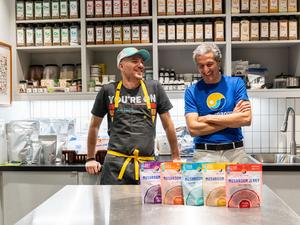
Joshua Green and Samuel Adetunji quit their Fortune 500 sales jobs to break into the medical cannabis industry. Four years later, they’re eyeing a massive expansion for their D.C. startup to meet mounting demand amid the pandemic.
The partners behind D.C. health-tech startup Veriheal Inc., a platform that connects patients seeking medical marijuana cards with doctors, are riding a wave of 2020 growth they’re looking to replicate this year. On the to-do list: Get the word out, break into more markets beyond its existing 36 U.S. states, expand internationally and, eventually, be “seen as the experts of the industry,” Adetunji said.
The Black-owned business, founded in 2017, came from the co-founders’ experience with a previous venture delivering cannabis paraphernalia — lighters, pipes, papers, bongs — “because we wanted to be part of the industry but didn’t have enough money to start a dispensary,” Green said, “and everyone we delivered to had asked about getting a medical marijuana card.”
They saw the need, learned more about the industry — as the District was preparing to decriminalize cannabis — and they built Veriheal from there.
Here’s how it works: A patient goes to the website, indicates state and symptoms, and gets connected with a local doctor to consider approval for a card required to purchase medical cannabis at a dispensary. Veriheal does due diligence on each doctor, now with a network of more than 100 across the country for virtual or in-person appointments. That’s because still, some people prefer to go in-person, so “our platform facilitates both,” Green said.
The company has helped register 175,000 patients across the U.S. and serves 2.5 million medical marijuana users each year.
Veriheal’s target market comprises people looking to purchase cannabis and use it legally, and “know the exact properties of the medicine they’re getting,” Adetunji said. Those patients can typically purchase more for less money and “may still want a relationship with the doctor who’s actually an expert on cannabis,” Green said. And the increasing push for more states to legalize recreational marijuana doesn’t affect the business that much, Green said, “because there are still many, many patients that require and desire to go to a medical cannabis dispensary.”
The pandemic drove the co-founders to shift their model, previously split between in-person and online appointments to about 90% online. And the business grew about 25% during the pandemic because of an increasing need for people to reduce anxiety, they said.
Veriheal is looking to keep that momentum up, while expanding its offerings and revenue streams. The company’s core model involves a $200 annual fee to use the platform, and a service fee for connecting patients with doctors. It also has a media arm with educational videos to help people learn about medical marijuana, and separately launched a scholarship program with $10,000 grants for college students in cannabis-related fields. Veriheal is “in a lane of our own a little bit,” Green said, “and hopefully we can carve it out enough that it stays that way.”
Now Veriheal is looking to partner with firms or groups that could support its growth, still nailing down what those collaborations could look like. It could include a national cannabis holding firm like Curaleaf Inc., a private equity firm with a global footprint or a pharmaceutical giant that wants to break into medical marijuana, Adetunji said.
The company, now with 60 employees between its Northeast D.C. headquarters and a second office in Denver, generated $50,000 in revenue in 2017 and now counts “several million dollars” in revenue, Green said, declining to share exact figures.
Veriheal is profitable, with no outside investors or loans — entirely bootstrapped. The partners sold their houses, cashed out on their retirement and each put in about $25,000, Green said. “And it has, of course, been the best investment we ever made.”




